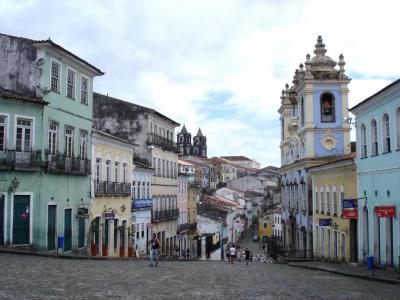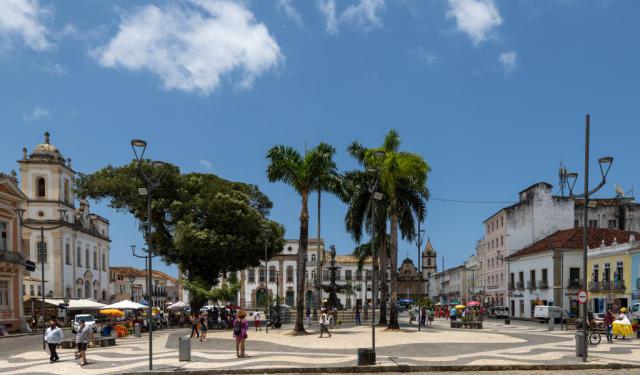Largo do Pelourinho (Pillory Square), Salvador
The moment you set foot in this square, you’ll be met with a baroque symphony of ornate church spires, pastel-hued mansions, and the cubist-like patchwork of houses cascading down the steep hillsides. It’s no wonder UNESCO crowned this area as the most important cluster of 17th- and 18th-century colonial architecture in the Americas. High praise-and well-deserved.
Locals have always called it Pillory Square. The name harks back to its grim past as the site of Salvador’s infamous whipping post, where public flogging was a legal spectacle until 1835. But these days, the scene is nothing short of joyful. By day, you may find vendors selling colorful naif paintings and enthusiastically offering to braid tourists’ hair. When the sun sets, the air fills with the hypnotic rhythms of Afro-Bahian blocos like Olodum, whose beats practically demand that you get up and dance.
Amid this lively backdrop, the City Museum calls a stately colonial mansion home. Inside, Catholic saints and ex-votos share space with statues of African deities and Candomblé artifacts. There’s also a secular side, with pieces from local artists and a room dedicated to Castro Alves, the celebrated abolitionist and Romantic poet.
Next door, you’ll find the Jorge Amado House, a small but heartfelt tribute to Bahia’s beloved author of “Dona Flor and Her Two Husbands.” Photos, book covers, and memorabilia fill the rooms, while a cozy on-site café named after his wife, Zélia Gattai, invites you to pause and sip. If that stirs your appetite for even more Bahian flavor, head over to the Bahian Gastronomy Museum-a delightful way to dive into the region’s culinary heritage.
Locals have always called it Pillory Square. The name harks back to its grim past as the site of Salvador’s infamous whipping post, where public flogging was a legal spectacle until 1835. But these days, the scene is nothing short of joyful. By day, you may find vendors selling colorful naif paintings and enthusiastically offering to braid tourists’ hair. When the sun sets, the air fills with the hypnotic rhythms of Afro-Bahian blocos like Olodum, whose beats practically demand that you get up and dance.
Amid this lively backdrop, the City Museum calls a stately colonial mansion home. Inside, Catholic saints and ex-votos share space with statues of African deities and Candomblé artifacts. There’s also a secular side, with pieces from local artists and a room dedicated to Castro Alves, the celebrated abolitionist and Romantic poet.
Next door, you’ll find the Jorge Amado House, a small but heartfelt tribute to Bahia’s beloved author of “Dona Flor and Her Two Husbands.” Photos, book covers, and memorabilia fill the rooms, while a cozy on-site café named after his wife, Zélia Gattai, invites you to pause and sip. If that stirs your appetite for even more Bahian flavor, head over to the Bahian Gastronomy Museum-a delightful way to dive into the region’s culinary heritage.
Want to visit this sight? Check out these Self-Guided Walking Tours in Salvador. Alternatively, you can download the mobile app "GPSmyCity: Walks in 1K+ Cities" from Apple App Store or Google Play Store. The app turns your mobile device to a personal tour guide and it works offline, so no data plan is needed when traveling abroad.
Largo do Pelourinho (Pillory Square) on Map
Sight Name: Largo do Pelourinho (Pillory Square)
Sight Location: Salvador, Brazil (See walking tours in Salvador)
Sight Type: Religious
Guide(s) Containing This Sight:
Sight Location: Salvador, Brazil (See walking tours in Salvador)
Sight Type: Religious
Guide(s) Containing This Sight:
Walking Tours in Salvador, Brazil
Create Your Own Walk in Salvador
Creating your own self-guided walk in Salvador is easy and fun. Choose the city attractions that you want to see and a walk route map will be created just for you. You can even set your hotel as the start point of the walk.
Salvador Introduction Walking Tour
Salvador is a coastal city in Brazil. Founded in 1548, it is the country's former capital and serves as the current capital of the state of Bahia. It is one of the oldest planned cities in the Americas.
Due to its location, early Europeans turned Salvador into an important trade route for slavery. Of the nearly 5 million enslaved people who were imported to Brazil, about 1.3 million were... view more
Tour Duration: 1 Hour(s)
Travel Distance: 1.6 Km or 1 Miles
Due to its location, early Europeans turned Salvador into an important trade route for slavery. Of the nearly 5 million enslaved people who were imported to Brazil, about 1.3 million were... view more
Tour Duration: 1 Hour(s)
Travel Distance: 1.6 Km or 1 Miles
Salvador's Historical Churches Tour
In Salvador, Brazil, there are quite a few churches emblematic of its cultural and religious heritage. The city's historic district contains so many old Catholic temples that some even joke that you can have a different church to visit there every day of the year. However, if you don't have a whole year to spend in Salvador but still want to make the most of your time in terms of... view more
Tour Duration: 1 Hour(s)
Travel Distance: 2.1 Km or 1.3 Miles
Tour Duration: 1 Hour(s)
Travel Distance: 2.1 Km or 1.3 Miles





